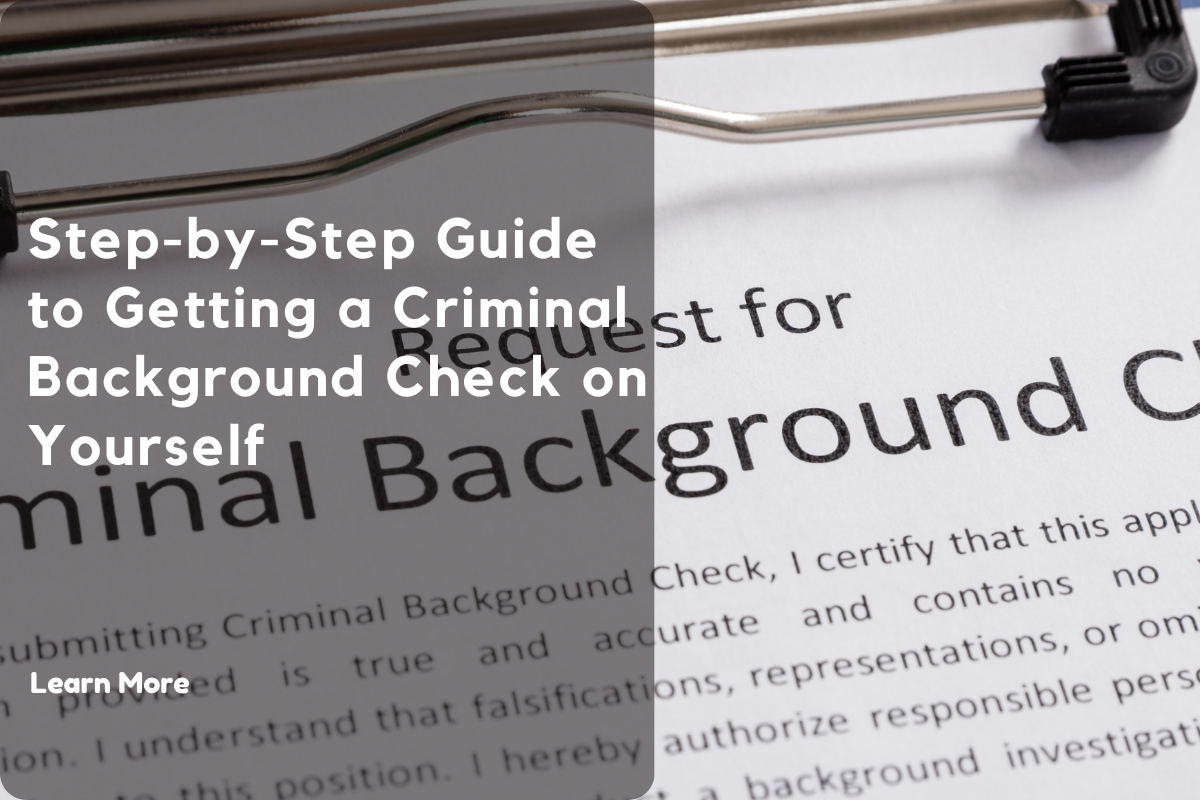 Introduction to Criminal Background Checks and Why You Might Need One
Introduction to Criminal Background Checks and Why You Might Need One
A criminal background check is a process that verifies an individual’s criminal history. It typically involves looking into any criminal records, including arrests, charges, convictions, and incarcerations. These checks are essential in various scenarios, helping employers, landlords, and even government entities assess an individual’s suitability for a job, tenancy, or certain legal rights. The check can reveal misdemeanors, felonies, or even cases that ended in dismissal, depending on the type and scope of the background search.
While criminal background checks are often used by employers and landlords to screen candidates for positions or housing, there are also significant reasons for individuals to check their own criminal records. It can be a proactive step in preventing surprises during job applications or legal proceedings, where criminal history is a crucial factor. Understanding your criminal record can give you the opportunity to address any inaccuracies or outdated information that could negatively affect your opportunities.
Why Would You Need to Perform a Criminal Background Check on Yourself?
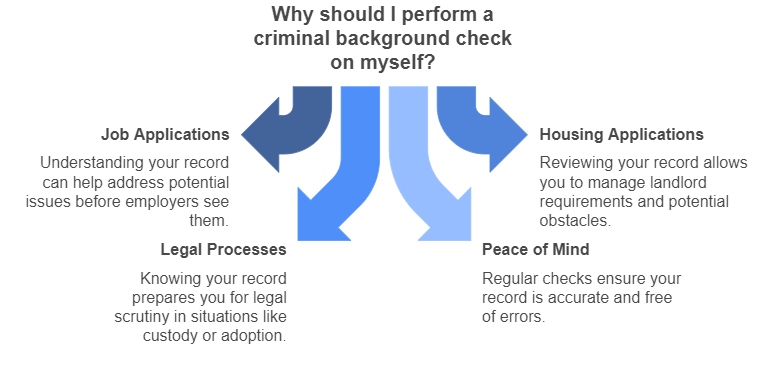
Checking your own criminal background can serve several critical purposes:
- Job Applications: Many employers, especially those in industries that require trust, like healthcare, finance, or education, will run criminal background checks on job applicants. Checking your record beforehand allows you to understand what an employer might see and address any issues early on.
- Housing Applications: Landlords often require criminal background checks as part of the rental application process. A prior conviction could impact your ability to rent a home, so reviewing your record gives you the chance to make corrections or offer explanations if necessary.
- Legal or Government Processes: In certain legal contexts, such as applying for government assistance, child custody cases, or adopting children, your criminal history may be scrutinized. Knowing your criminal record ensures you’re not caught off guard when required to disclose this information.
- Peace of Mind: Even if you’re not applying for a job or housing, regularly checking your criminal record can provide peace of mind. Mistakes, like false accusations or incorrect information on your record, can often be resolved through proactive checks.
By reviewing your criminal background, you can ensure that your record is accurate, up-to-date, and free of errors that could negatively affect your personal or professional life.
Types of Criminal Background Checks
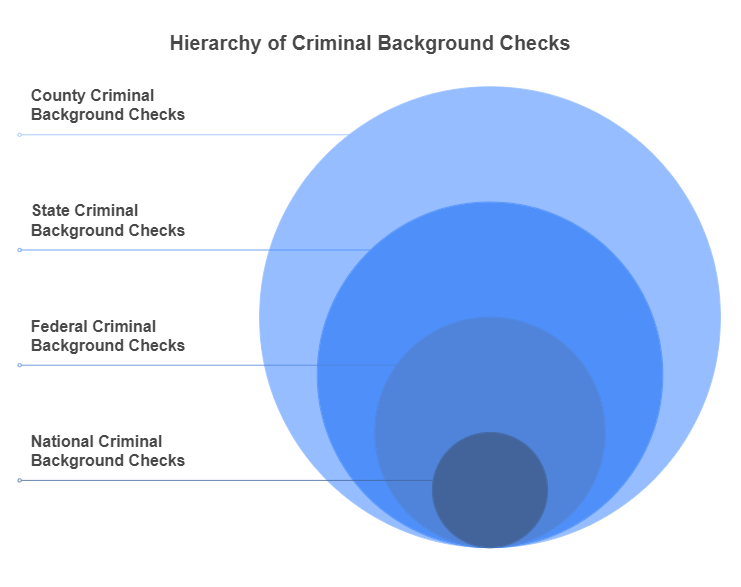
When checking your criminal background, it’s important to understand that different types of checks will access different databases and may provide varying levels of detail. Here are the most common types of criminal background checks:
- County Criminal Background Checks: This is the most localized form of a criminal check and typically reveals records within a specific county or jurisdiction. County checks tend to focus on arrests, misdemeanor convictions, and felony charges that were processed in local courts.
- State Criminal Background Checks: A state check covers a broader scope, examining records across the entire state. It may provide more comprehensive information about an individual’s criminal history than a county check, including convictions, arrests, and pending cases.
- Federal Criminal Background Checks: This check covers crimes that fall under federal jurisdiction, such as immigration violations, fraud, and other offenses that are prosecuted by the federal government. Federal checks tend to be more extensive but focus only on violations that are classified as federal crimes.
- National Criminal Background Checks: A national check aggregates data from various state, county, and federal sources, providing a more complete picture of an individual’s criminal history. This check is typically broader in scope, which is why it is often used by employers or other entities requiring a comprehensive criminal history report.
The scope of a background check largely depends on the type of check requested and the database being searched. Federal and national checks are often used by employers or organizations that need a broad overview of an individual’s criminal history. On the other hand, county and state checks are more limited in their scope but are often more targeted to specific jurisdictions or areas.
Why Checking Your Own Criminal Record is Important
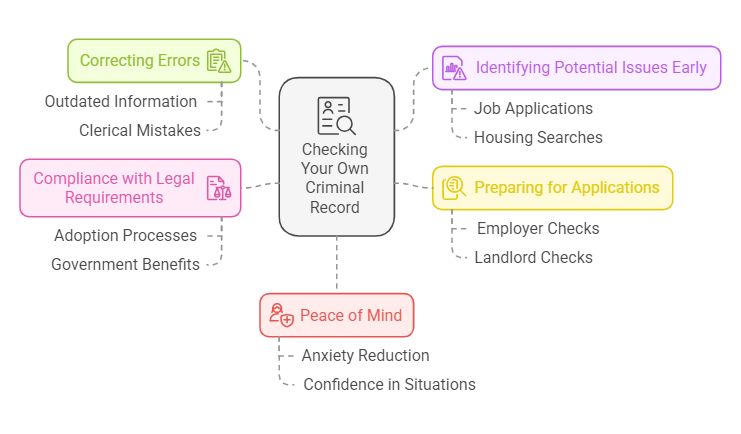
Checking your own criminal record can serve several purposes:
- Correcting Errors: It’s not uncommon for individuals to find errors or discrepancies in their criminal background records. This could be due to outdated information, mistaken identity, or clerical mistakes. By reviewing your own record, you have the opportunity to spot and correct any mistakes that could be harmful if they appear during a background check.
- Identifying Potential Issues Early: If you have a criminal history, checking your record gives you a chance to address any issues before they come up in job applications, housing searches, or legal proceedings. It may also provide an opportunity to explain or mitigate any past issues if necessary.
- Preparing for Job or Housing Applications: Employers and landlords often require background checks to assess potential tenants or employees. By checking your criminal record ahead of time, you can prepare to discuss any relevant issues or offer explanations when required.
- Compliance with Legal Requirements: Some situations, like adopting children or applying for certain government benefits, may require a criminal background check. Checking your record beforehand allows you to ensure compliance with all necessary regulations, which can save time and prevent surprises.
- Peace of Mind: Knowing your criminal background can alleviate any anxiety about what might be discovered in the future. Whether you’re concerned about potential discrepancies or you’re simply curious, having a clear understanding of your record gives you confidence in navigating situations where your criminal history may be considered.
What Information Does a Criminal Background Check Include?
A criminal background check generally includes:
- Felony Convictions: Any serious criminal offenses that could lead to lengthy prison sentences are listed here.
- Misdemeanors: Less severe crimes, such as petty theft or public intoxication, may appear on your record.
- Arrest Records: Even if you were never convicted, the fact that you were arrested may be included, depending on the type of check.
- Pending Charges: In some cases, background checks will list charges that have not yet been resolved in court.
- Sex Offender Registry: If applicable, your criminal history might also show whether you are registered on the sex offender list.
- Warrants: Any outstanding warrants for arrest or other legal proceedings may also be included in your criminal record.
It’s essential to review these details to ensure accuracy and prevent surprises in situations where your criminal history could be evaluated.
How to Get a Criminal Background Check on Yourself
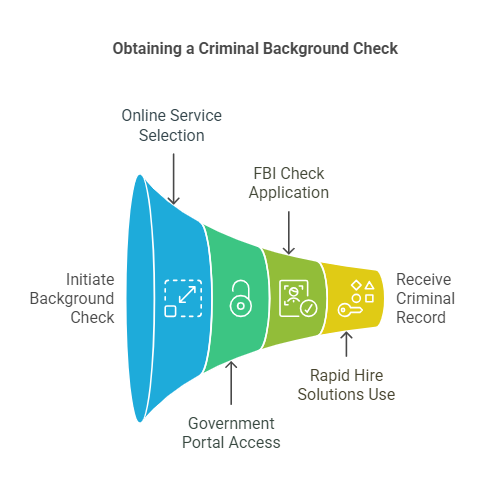
Methods for Obtaining Your Criminal Background Check
When it comes to obtaining a criminal background check on yourself, there are several routes you can take. These methods vary in terms of convenience, detail, and cost. Below, we explore the most common ways to get a criminal background check on yourself.
1. Online Criminal Background Checks
One of the easiest and quickest methods for obtaining your criminal background check is through online services. Many companies offer fast and affordable background check services, providing you with your criminal record in a matter of minutes.
Here’s how the process typically works:
- Choose a Reputable Online Service: When selecting an online service, look for companies that are well-reviewed and offer accurate, comprehensive reports. These services usually aggregate data from public records and various criminal databases, so you can get a broad overview of your criminal history.
- Enter Personal Information: You’ll be required to enter some personal details, such as your name, date of birth, and in some cases, your social security number. This helps ensure the accuracy of the search and matches your criminal record to the right individual.
- Receive the Report: Once the search is complete, the service will provide you with a detailed report of your criminal history. Depending on the service, you may receive a general summary or a more detailed account of your records, including any felony, misdemeanor, or arrest records.
- Cost: Online services can range in cost, typically starting at $20 and going up to $100 or more, depending on the level of detail and the provider. Some services offer a free basic report, while more comprehensive searches will require a fee.
Advantages of Online Services:
- Quick and easy access to your criminal record.
- Convenient for people who need a background check urgently.
- Offers varying levels of detail, depending on the service.
Disadvantages:
- Results may not be as thorough as government-run checks.
- Accuracy can vary, so it’s essential to use a reputable service.
2. State and Local Government Websites
Another option for obtaining your criminal background check is by going directly through state or local government websites. Most states and counties have official portals where residents can request their criminal records. The process is usually straightforward, and the results tend to be highly reliable.
Here’s how you can access your criminal record through government websites:
- Locate the Right Website: Begin by finding the appropriate government website for your state or county. Many states have a centralized system for background checks, while others may require you to request records from individual counties or courts.
- Request Your Criminal Record: Follow the instructions on the website to request your criminal background check. You’ll typically need to provide identifying information, such as your full name, date of birth, and sometimes fingerprints.
- Pay Fees: Some government portals charge a small fee for processing criminal record requests. The costs vary, but they are generally between $5 and $30 for state-level checks. Local checks may be more affordable or could be free, depending on the jurisdiction.
- Wait for Processing: After submitting your request, you’ll need to wait for the processing time. This can range from a few days to several weeks, depending on the state or county. Some states offer expedited services for an additional fee.
Advantages of Government Websites:
- Reliable and official source of criminal records.
- Transparent pricing and processing timelines.
- You receive a direct report from the government, which ensures accuracy.
Disadvantages:
- Can take longer to process, especially if you request records from local or county courts.
- May require in-person visits or fingerprinting in some jurisdictions.
3. FBI Criminal Background Check
For those who need the most thorough and official record, an FBI background check is the gold standard. The FBI background check covers all criminal activities within the federal jurisdiction and includes data from state, county, and federal databases.
Here’s how to request an FBI background check:
- Complete the FBI Background Check Application: Visit the FBI’s official website and download the background check application form (Form FD-258). You’ll need to fill out the form with your personal information.
- Fingerprinting: One of the most important steps in obtaining an FBI check is getting your fingerprints taken. You can get your fingerprints done at a local police station, a certified fingerprinting agency, or an authorized FBI fingerprinting location.
- Submit Your Request: Once you have completed the form and had your fingerprints taken, you can submit your request to the FBI either online or by mail. If you submit online, you’ll need to provide digital fingerprints. For mail-in requests, you’ll need to send physical copies of your fingerprints along with your application.
- Cost: The cost of an FBI background check is typically around $18 for a basic report. Additional fees may apply for expedited processing or mailing.
- Processing Time: An FBI background check can take several weeks, often ranging from 3 to 5 weeks. You may also request expedited processing for an additional fee.
Advantages of an FBI Check:
- Most comprehensive check, covering federal, state, and county records.
- Officially recognized by employers, government agencies, and legal bodies.
- Includes all available criminal information under federal jurisdiction.
Disadvantages:
- More time-consuming than online or state-level checks.
- Requires fingerprinting, which may involve additional effort and cost.
- Higher cost compared to other options.
4. Rapid Hire Solutions as an Alternative
While online government portals and FBI checks are reliable, they can be time-consuming and may require extra effort on your part. A third-party service like Rapid Hire Solutions can simplify the process, offering a convenient and streamlined way to obtain your criminal background check.
Rapid Hire Solutions provides individuals with easy access to comprehensive background checks, including criminal history reports. Their platform simplifies the entire process, ensuring you receive accurate and up-to-date information with minimal effort. Whether you’re looking for a basic county-level check or a nationwide criminal background check, Rapid Hire Solutions offers a range of services tailored to your needs.
Additionally, Rapid Hire Solutions can assist with bulk background checks for businesses or organizations that need to screen multiple candidates or employees. Their user-friendly platform and competitive pricing make it an excellent choice for individuals and businesses alike.
Advantages of Using Rapid Hire Solutions:
- Simplified process with fewer steps than government portals.
- Faster turnaround times for background checks.
- Reliable and accurate reports that meet legal and employment standards.
Disadvantages:
- Some services may have a higher cost compared to free government checks.
- Not as exhaustive as FBI background checks, depending on the service level chosen.
Comparing Methods for Obtaining a Criminal Background Check
| Method | Cost | Processing Time | Level of Detail | Pros | Cons |
|---|---|---|---|---|---|
| Online Services | $20 – $100+ | Instant to 24 hours | Varies, general to detailed | Quick, convenient | Accuracy can vary |
| State/Local Government Check | $5 – $30 | Several days to weeks | State and local records | Reliable, official | Can take time to process |
| FBI Check | $18+ | 3 – 5 weeks | Most comprehensive | Thorough, official | Time-consuming, fingerprinting |
| Rapid Hire Solutions | Varies | 24 – 48 hours | Varies, comprehensive | Fast, simple process | May cost more than government |
Legal Aspects of Obtaining a Criminal Background Check
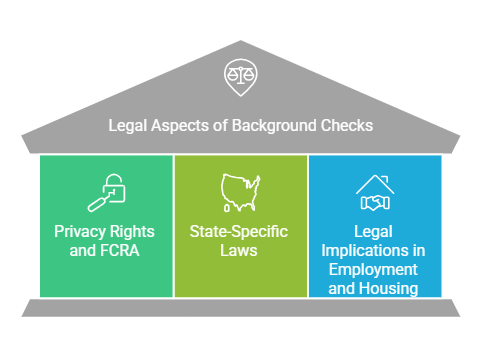
When obtaining a criminal background check on yourself, it’s crucial to understand the legal considerations that come with it. These include your privacy rights, the regulations around criminal record retention, and how your background information can be used by third parties.
1. Privacy Rights and The Fair Credit Reporting Act (FCRA)
The Fair Credit Reporting Act (FCRA) is a federal law that regulates the collection, dissemination, and use of consumer information, including criminal background data. While the FCRA primarily applies to credit reports, it also affects background checks conducted for employment or other purposes.
- Consent: Under the FCRA, you are allowed to access your own criminal record without requiring consent. However, if a third party (such as an employer) requests the background check, their use of the information is subject to the FCRA’s rules, which include providing consent before conducting the check and notifying you if a decision is made based on your criminal history.
- Accuracy and Dispute: The FCRA ensures that the information you receive from criminal background checks is accurate. If you find any discrepancies or errors on your criminal record, you have the right to dispute the information with the reporting agency or the relevant government body.
- Time Limitations: The FCRA also imposes limits on how far back certain types of criminal records can be reported, especially in the context of employment. For example, convictions over seven years old generally cannot be reported for employment purposes unless the position involves significant financial responsibilities.
2. State-Specific Laws
In addition to federal regulations, each state may have its own rules regarding criminal record access and retention. Some states may limit how far back criminal records can be accessed for employment purposes, while others may allow employers or individuals to request full records that go back many years.
For example, certain offenses, such as minor drug convictions or misdemeanors, may be expunged after a set period, meaning they are removed from your record. If you’re unsure about your state’s laws, check with the local court or a legal professional to understand how your state handles criminal record access.
3. Legal Implications of Background Checks in Employment and Housing
If you’re checking your own criminal background as part of a job application or housing rental process, it’s important to be aware of how employers and landlords can use that information. In most cases, criminal background checks are legal, but there are restrictions on how the results can be used.
- Employment: Employers may use criminal background checks to determine whether you’re suitable for a particular job. However, federal and state laws prohibit discrimination based solely on criminal history in some cases, especially if the offense is unrelated to the job or occurred many years ago. The Equal Employment Opportunity Commission (EEOC) outlines guidelines on how employers should assess criminal history in relation to the job.
- Housing: Landlords may also conduct background checks to ensure that tenants do not have a history of criminal activity that could pose a risk to the safety or wellbeing of other residents. Like employers, landlords must also follow certain legal guidelines and cannot automatically reject an applicant based solely on their criminal history, particularly if the offense occurred long ago or was minor.
Frequently Asked Questions (FAQs)
Here are some frequently asked questions about how to get a criminal background check on yourself:
Do I need to give consent to obtain my own criminal background check?
No, you do not need to provide consent to check your own criminal background. The Fair Credit Reporting Act (FCRA) grants you the right to access your own criminal records.
How far back does a criminal background check go?
The length of time a criminal background check covers can vary depending on the type of check and the jurisdiction. For example, an FBI check will typically cover your entire criminal history, while some states limit how far back certain criminal records can be accessed for employment purposes.
Can I remove something from my criminal record?
In some cases, criminal records can be expunged or sealed, meaning they are no longer visible on background checks. Expungement laws vary by state and the type of crime committed. Generally, felonies are harder to expunge, but some minor offenses may be eligible.
How long does it take to get my criminal background check results?
The timeline depends on the method you use to request the check. Online services can provide results within minutes, state and local government checks may take a few days to weeks, and FBI checks can take 3-5 weeks.
Are online criminal background checks accurate?
The accuracy of online criminal background checks depends on the service provider. Reputable services that pull data from verified public databases tend to offer reliable reports, but results may not be as comprehensive or current as government-run checks. Always choose a service with high reviews and a good reputation for accuracy.
Conclusion
Obtaining a criminal background check on yourself is a straightforward process, but it’s essential to understand the different methods, the costs, and the legal implications involved. Whether you’re preparing for an employment opportunity, renting a home, or simply ensuring the accuracy of your record, knowing how to get a criminal background check and what to expect can help you avoid surprises and make informed decisions.
As outlined in this guide, there are several methods for obtaining a criminal background check, each with its own advantages and limitations. Online services offer convenience and speed, state and local government websites provide official records, and the FBI background check offers the most thorough examination of your criminal history. Be sure to evaluate the method that best suits your needs and budget.
Understanding the legal framework surrounding criminal background checks, especially the Fair Credit Reporting Act and state-specific laws, ensures that you can access your record responsibly and know your rights. If you’re unsure about the process, using a reliable third-party service like Rapid Hire Solutions can simplify the process and ensure you get an accurate, thorough report quickly.
By staying informed and proactive about your criminal record, you can take control of your background check process, making sure that the information you provide to potential employers, landlords, or legal entities is accurate and up-to-date.
